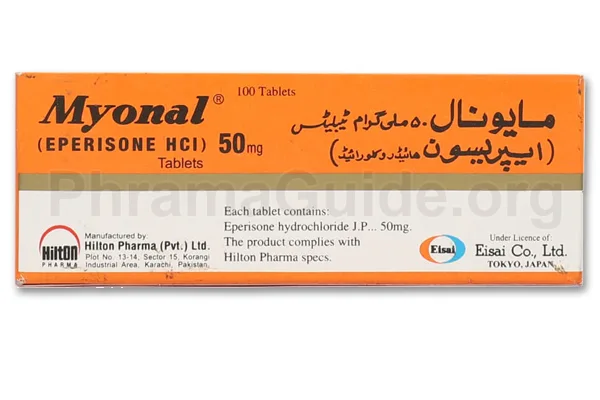Myonal is a muscle relaxant used to relieve muscle stiffness and pain. It works by inhibiting the release of excitatory amino acids in the spinal cord, resulting in muscle relaxation. Like any medication, Myonal may cause side effects. Common and less common side effects reported with the use of Myonal include.
Common Side Effects
- Drowsiness or fatigue: Myonal may cause drowsiness or a feeling of tiredness, which can impair concentration and reaction times.
- Gastrointestinal disturbances: Some individuals may experience with Myonal, gastrointestinal side effects such as nausea, vomiting, or stomach discomfort.
- Dizziness: Myonal may cause dizziness, especially when standing up quickly. It’s important to be cautious when engaging in activities that require alertness, such as driving until you know how the medication affects you.
- Headache: Headaches are a common side effect of many medications, and some people may experience this while taking Myonal.
- Dry mouth: A dry or parched feeling in the mouth may occur as a side effect of Myonal.
- Skin rash or itching: Some individuals may develop skin reactions, such as rash or itching, as a response to Myonal.
- Orthostatic hypotension: Myonal may cause a drop in blood pressure upon standing, leading to feelings of dizziness or lightheadedness.
- Flushing (redness of the skin): Some people may experience a temporary redness or flushing of the skin associated with Myonal.
Less Common Side Effects
- Allergic reactions: Although rare, some individuals may experience allergic reactions to Myonal, which can manifest as skin rash, itching, swelling, severe dizziness, or difficulty breathing. Seek medical attention if you observe any signs of an allergic reaction.
- Changes in liver function: There have been reports of abnormalities in liver function tests in some patients taking Myonal. Regular monitoring of liver function may be necessary in certain cases.
- Abdominal pain: Less commonly, Myonal may cause abdominal pain or discomfort.
- Urinary retention: Some individuals may experience with Myonal difficulty or inability to empty the bladder completely, known as urinary retention.
- Hypersensitivity reactions: In rare cases, Myonal may lead to hypersensitivity reactions beyond skin rash or itching, including more severe allergic responses.
- Confusion or disorientation: There have been isolated reports of confusion or disorientation as a side effect of Myonal.
- Elevated heart rate (tachycardia): Although not common, some individuals may experience an increase in heart rate.
- Nervous system effects: Less common effects on the nervous system may include associated with Myonal tremors, ataxia (loss of coordination), or speech disorders.

What is Myonal?
Myonal is one of the leading brands of Eperisone HCl, manufactured by Eisai Co, Ltd. Japan and marketed by Hilton Pharmaceuticals (Pvt) Ltd, Pakistan.
Myonal : Available Formulations and Strengths
Presently, Myonal is available in Tablet Form.
Myonal Tablet : 50mg strength.
What Are The Possible Drug Interactions of Myonal?
- CNS depressants: Myonal can cause drowsiness and central nervous system (CNS) depression. Combining it with other CNS depressants, such as alcohol, sedatives, hypnotics, or certain antidepressants, may increase the risk of excessive sedation.
- Antihypertensive drugs: Myonal may have additive effects with medications that lower blood pressure. Combining it with other antihypertensive drugs could lead to further blood pressure reduction.
- Medications affecting liver enzymes: Myonal is metabolized in the liver, so drugs that affect liver enzymes may influence its metabolism. Care should be taken when using Myonal with drugs known to induce or inhibit liver enzymes.
- Fluvoxamine: The antidepressant fluvoxamine may increase the blood levels of Myonal, potentially leading to an increased risk of side effects. If co-administration is necessary, close monitoring is advised.
- Cimetidine: Cimetidine, an H2 receptor antagonist used to treat ulcers, may increase the blood levels of Myonal, potentially leading to an increased risk of side effects.
- Erythromycin: Erythromycin, an antibiotic, may increase the blood levels of Myonal, potentially leading to an increased risk of side effects.
- Antifungal medications: Some antifungal medications, such as ketoconazole and itraconazole, may interact with Myonal and increase its blood levels.

Leave A Comment